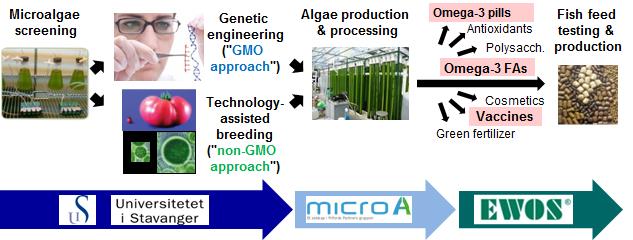 |
Peroxisome Biology of Plants and MicroalgaeResearch group by Prof. Dr. S. ReumannCentre for Organelle Research (CORE) University of Stavanger, Norway University of Hamburg (Germany) |
 |

| Research projects: | Reumann lab > Research projects > Microalgae | |
| Bioinformatics Innate immunity Microalgae research Proteomics Stress adaptation  Agar plate with microalgae
 Partners of the research
consortium "Microalgae 2021":
   |
Microalgae 2021: Optimizing the productivity of microalgae in synthesizing high-value bio-productsAquaculture industry is one of the fastest growing food sectors worldwide and a major industry in Norway, having the potential to grow from today 90 to 550 bill. NOK in 2050 (600%). Fish farming and fish feed production play major roles in Norway’s aquaculture industry. The high nutritional value of fish primarily lies in their high content of long-chain polyunsaturated fatty acids (LC-PUFAs, omega-3/-6 FAs e.g. EPA, DHA, ARA), which have clinically proven, preventive effects on several human illnesses. These compounds, however, cannot be produced de novo by animals, chemical synthesis or native oilseed plants. Their main, but non-sustainable source is nowadays only marine fish oil. Worldwide attempts are being made to improve the current sources of omega -3 LC-PUFA and to provide a sustainable supply of dietary EPA and DHA. The primary producers of LC-PUFAs are microalgae.Microalgae ("phytoplankton"), also referred to as the "new crops of the 21st century", have an enormous potential use in diverse commercial and industrial applications carbon neutral synthesis of fuels, pharmaceuticals, high-value nutritional food and feed, and materials relevant to nanotechnology. Yet, their commercialization remains unexplored due to insufficient technology development, primarily in biological technology. Even though internationally leading in physiology and ecological research, Norway has remained underdeveloped in molecular microalgae research.In this long-term project "Microalgae 2021", we aim at establishing a fundamental biotechnological toolbox for microalgae R&D in Norway. The target algae are production strains of omega-3 fatty acids. We will try to create a molecular toolbox that is required for genetic engineering of microalgal production strains (e.g. nuclear and chloroplast transformation) to allow metabolic engineering. We also intend to develop technology-assisted breeding (non-GM approach) by forward genetic screens to optimize omega-3 fatty acid productivity. High-level gene recombinant protein expression such as fish vaccines shall facilitate the commercialization of microalgae and product extraction by a biorefinery approach.Microalgae 2021 brings together three partners of complementary, interdisciplinary expertise, namely academia (UiS/CORE), a microalgae SME (MicroA) and the end-user and fish feed producer EWOS Innovation, to form a new, productive research consortium in the “oil capital” Stavanger to promote bio-economie.The ideal neighboring location of the three partners in the Stavanger region allows tight collaboration and R&D optimization from the bench to fish feed trials. |
 Fish farm  AlgaeParc in Wageningen (The Netherlands)  Algae house at the IBA 2013 in Harburg (Germany)  Microalga Nannochloropsis |
 |
||
|
|
||